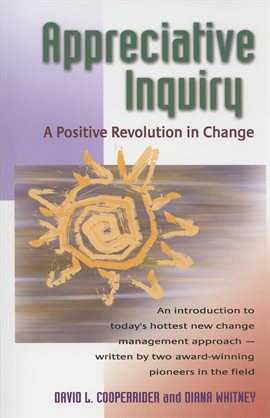
eBook
hoopla Instant
Appreciative Inquiry
Year
2005
Language
ENGLISH
Publication Information
Berrett-Koehler Publishers
Summary
Written by the two most recognized Appreciative Inquiry thought leaders. A quick, accessible introduction to one of the most popular change methods today--proved effective in organizations ranging from Roadway Express and British Airways to the United Nations and the United States Navy. Appreciative Inquiry (AI) is a model of change management uniquely suited to the values, beliefs, and challenges of organizations today. AI is a process that emphasizes identifying and building on strengths, rather than focusing exclusively on fixing weaknesses as most other change processes do. As the stories in this book illustrate, it results in dramatic improvements in the triple bottom line: people, profits, and planet. AI has been used to significantly enhance customer satisfaction, cost competitiveness, revenues, profits, and employee engagement, retention, and morale, as well as organizations' abilities to meet the needs of society. This book is a concise introduction to Appreciative Inquiry. It provides a basic overview of the process and principles of AI along with exciting stories illustrating how organizations have applied AI and the benefits they have gained as a result. It has been specifically designed to be accessible to a wide audience so that it can be handed out in organizations where AI is either being contemplated or being implemented. Written by two of the key figures in the development of Appreciative Inquiry, this is the most authoritative guide available to a change method that systematically taps the potential of human beings to make themselves, their organizations, and their communities more adaptive and more effective.